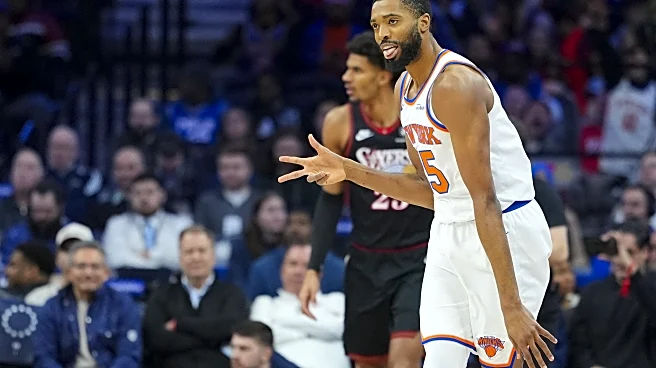What's Happening?
Lionel Messi has completed a remarkable season with Inter Miami, raising questions about the team's potential to win the MLS Cup. As the regular season concludes, analysts are debating whether Messi's
performance can propel Miami to victory. Meanwhile, the Philadelphia Union is also under scrutiny to see if they can translate their regular season success into postseason triumph. Additionally, D.C. United faces challenges as they struggle to find their footing. Julie Foudy, a USWNT legend, has shared insights on the future of the NWSL, emphasizing the need for changes to retain top talent. Discussions also include Emma Hayes' impact on the USWNT and reflections on Foudy's influential class that contributed to the national team's enduring success.
Why It's Important?
Messi's performance is pivotal for Inter Miami's aspirations in the MLS Cup, potentially influencing the team's strategy and morale. His success could attract more international attention to the MLS, boosting its profile and competitiveness. The Philadelphia Union's ability to maintain their form in the playoffs could set a precedent for consistency in the league. Julie Foudy's comments on the NWSL highlight the ongoing challenges in women's soccer, particularly in retaining talent amidst competition from European leagues. These developments could shape the future of soccer in the U.S., affecting league policies and investment in women's sports.
What's Next?
Inter Miami will need to strategize effectively to leverage Messi's skills in the playoffs. The Philadelphia Union will aim to replicate their regular season success in the postseason. The NWSL may consider implementing changes to improve player retention and competitiveness. Observers will watch how Emma Hayes continues to influence the USWNT and whether her strategies will lead to long-term success. The outcomes of these scenarios could have lasting impacts on the MLS and NWSL, influencing future league dynamics and player movements.
Beyond the Headlines
Messi's influence extends beyond the field, potentially affecting the MLS's global reputation and marketability. The NWSL's struggle to compete financially with European leagues underscores broader issues in women's sports, including funding and media coverage. Julie Foudy's insights may prompt discussions on gender equity in sports and the importance of nurturing domestic talent. These factors could lead to cultural shifts in how soccer is perceived and supported in the U.S., impacting future generations of players and fans.










